My boss invited me on a fully paid vacation — should I go?
OP (32M) has a boss (38F) who blurs work and personal life. She frequently hosts happy hours, dinners, and casual outings with her team. During a recent 1-on-1, she surprised OP with an offer: an all-expenses-paid trip to Mexico. Not for business, just for fun.
She clarified that OP would have his own room and that it wasn’t romantic — she just thought they’d both enjoy the getaway. She’s in an on-and-off relationship with a boyfriend, and she didn’t present the invite in a flirtatious way. OP was caught off guard, said he’d think about it, and now wonders if accepting is a good idea. He loves his job, enjoys working with her, and wouldn’t mind a paid trip — but he doesn’t want to step into something messy.
When bosses act unprofessionally, employees have to be careful, as they might get trapped in a difficult situation

The poster shared that his boss is bad at separating her work life from her personal life and that she has always been very friendly with everyone
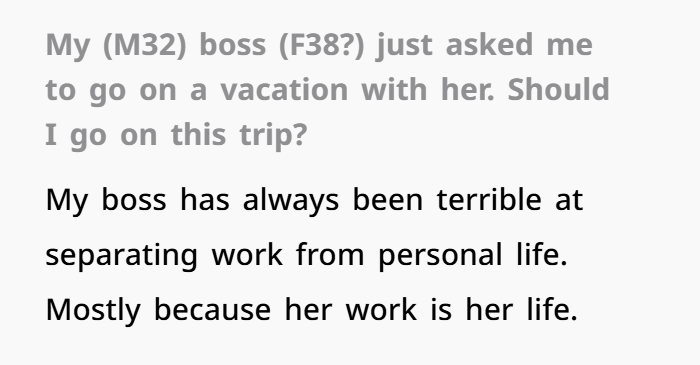
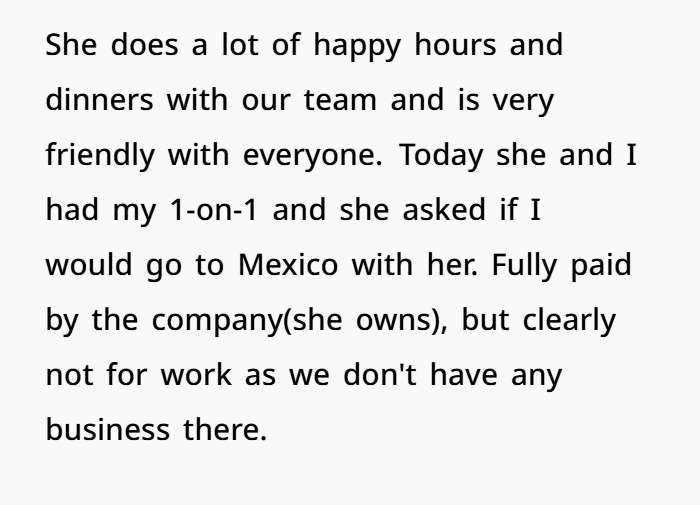

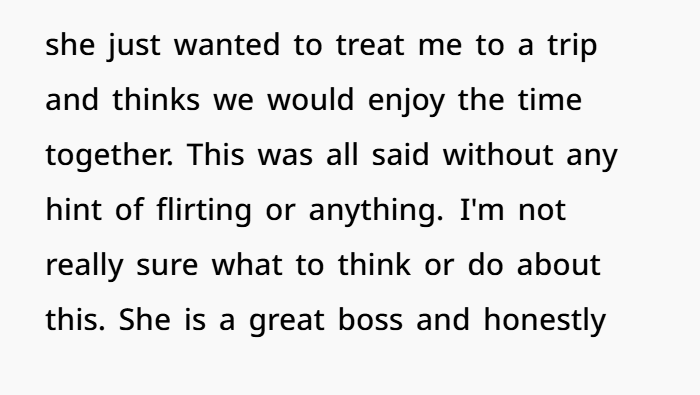
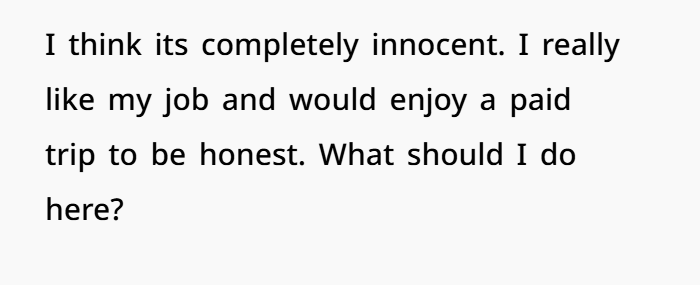


Alright, let’s cut through the margaritas and sunscreen here: this isn’t just about a free trip. It’s about boundaries, optics, and power dynamics.
1. The power imbalance
First, let’s acknowledge the obvious: she’s your boss. She controls your workload, promotions, raises, and potentially even your long-term career. When a boss invites an employee on a vacation — even innocently — it’s not a level playing field.
Even if she says it’s “just for fun,” you may feel pressure to say yes. That’s why HR departments and workplace ethics guidelines get twitchy about these scenarios. It blurs lines and opens the door for:

- Favoritism accusations: Other team members may feel you’re getting special treatment.
- Workplace gossip: The “oh, he went on a trip with the boss” rumors practically write themselves.
- Future awkwardness: What if she does get flirty while you’re there? Or what if she expects more personal closeness than you’re comfortable with?
2. Innocent or inappropriate?
Based on what you wrote, it sounds innocent. She’s social, she mixes work with fun, and she might genuinely just want a travel buddy. But here’s the thing: intent doesn’t always matter as much as perception.
To you, it might be “cool free vacation.” To coworkers, it could look like “he’s sleeping with the boss.” Once that seed is planted, it doesn’t matter if it’s false — perceptions can change reputations.
3. Legal and HR implications
- If she’s the company owner (as you said), then technically there may not be an HR department to complain to. But that also means fewer guardrails — and more risk for you if things sour.
- Workplace harassment law doesn’t require intent. If the situation ever made you feel pressured or uncomfortable, you’d have limited options, especially since she holds the power.
- Even if you’re comfortable, consider: what if her boyfriend finds out? What if coworkers feel uncomfortable? It can snowball fast.
4. The “what could go wrong?” scenarios
Think about a few possible outcomes:
- Best-case scenario: You go, it’s genuinely platonic, you have fun, come back with a tan and cool stories.
- Middling scenario: You go, coworkers gossip, you get side-eyed in the office, and suddenly people think you have special access to the boss.
- Worst-case scenario: She makes a move, you reject her, and work becomes awkward or hostile. Or, you accept her advances (even just once) and suddenly you’re entangled in something you didn’t want.
Ask yourself: can you handle the worst-case scenario if it happens?
5. Your personal situation
You added an edit — you’ve been married before, lost your wife young, and haven’t been with anyone since. First off, that’s heavy, and I’m sorry you went through that. It also makes sense why you’re cautious and not looking to complicate your personal life.

This is important: because of your history, you may not have the emotional bandwidth for something messy. And this? This has messy potential.
6. Real-world parallels
- Case study 1: A man went on a “friendly” vacation with his female boss. Even though nothing romantic happened, coworkers assumed it did. When promotions came around, people accused him of favoritism. His reputation never fully recovered.
- Case study 2: A woman’s boss invited her on “work-adjacent” trips. She turned them down, but later he held it against her subtly (less access, fewer opportunities). She ended up leaving the company.
- Case study 3: In rare cases, it does work out — boss/employee friendships can blossom into strong mentorships. But usually, those friendships happen within clear boundaries (like at work events, not vacations).
7. Alternative options
If you want to keep things light without diving into risky territory, here are some middle-ground responses:
- Counteroffer: “That’s generous, but I’d feel weird about just the two of us. Maybe we could do a team trip?” This frames it as a fun perk but avoids singling you out.
- Polite decline: “I really appreciate the offer, but I like to keep my vacations separate from work. Let’s definitely do a team happy hour soon though.”
- Stall: “That’s a big ask — let me think about it. I wouldn’t want it to look like favoritism.” Sometimes just voicing that concern makes the boss realize the awkwardness.
8. Gut check
The question to ask yourself: If something went wrong, would I regret going?
If the answer is yes, then don’t go. Free trip or not, peace of mind is priceless.
Netizens were divided, with some feeling that it would be a bad idea to go, and others thinking there would be no harm in his accepting the offer




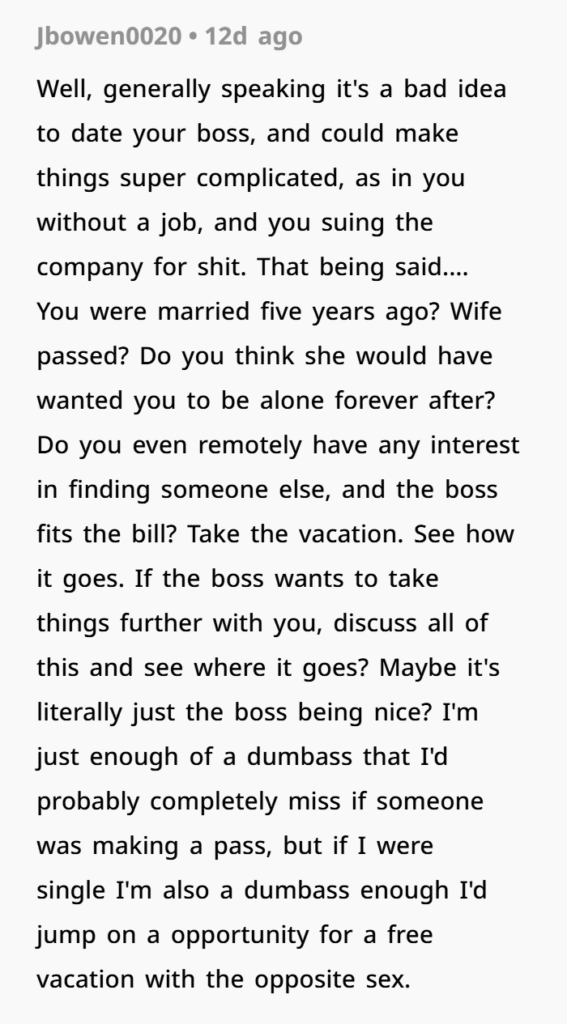

Leaning don’t go (at least not in this format). You’re NTA for considering it, and she’s not necessarily an AH for offering — but it’s risky. Power imbalance, gossip potential, and the chance for blurred lines could make this trip more trouble than it’s worth.
If she really wants to do something fun, suggest a group event with the whole team. That way, you keep the perks without putting yourself in a weird spot.

